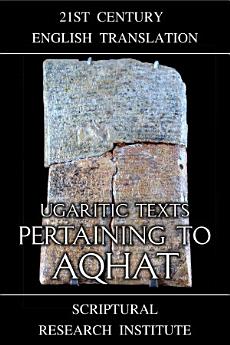Ugaritic Texts: Pertaining to Aqhat
អំពីសៀវភៅអេឡិចត្រូនិកនេះ
Only part of the story of Danel and Aqhat has been found, on three tablets, all of which are broken, leaving a fragmentary story which is, unfortunately, is missing its ending. Danel is spelled as Dnỉl in Ugaritic, which is similar to the later Aramaic spelling of Dny'l, and essentially identical to the Hebrew name of Dn'l. The Greeks translated both the name of the ancient saga that Ezekiel mentioned, and the later Israelite prophet from after the time of Ezekiel as Daniêl at the Library of Alexandria, which has resulted in the Ugaritic king's name being rendered as Daniel in some translations.
The three sections of text that survive on the tablets are all damaged, and were originally published in the order they were translated, but not the order that the story takes place in. As the texts are about Danel, the translations were named after him, resulting in the names 1 Danel, 2 Danel, and 3 Danel. However, while Danel may have been the protagonist, the original name of the story in the texts was Pertaining to Aqhat in Ugaritic, as the story was about Aqhat. This has resulted in the texts also being dubbed 1 Aqhat, 2 Aqhat, and 3 Aqhat, however, they were still not in the correct order, and so the revised translation in Hittite Myths and Instructions (1950) reordered them as Aqhat A (2 Danel/Aqhat), Aqhat B (3 Danel/Aqhat), and Aqhat C (1 Danel/Aqhat). This order has generally been followed ever since, and is the order followed here, however, the three sections of the texts are simply called sections 1, 2, and 3.










